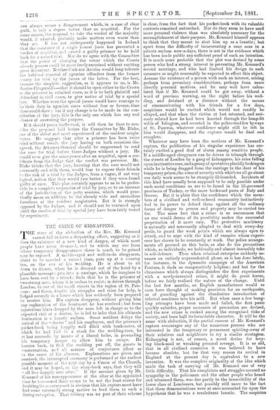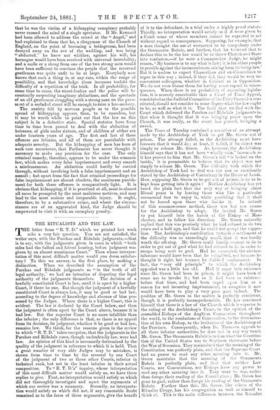THE CRIME OF KIDNAPPING.
• THE story of the abduction of the Rev. Mr. Kennard cannot fail to have a disquieting effect, suggesting as it does the existence of a new kind of danger, of which most people have never dreamed, and to which any one from whose temporary disappearance there is much to be gained may be exposed. A middle-aged and well-to-do clergyman, about to be married a second time, puts up at a country inn, on the eve of his wedding. He is about to sit down to dinner, when he is decoyed out of the hotel by a plausible message ; gets into a carriage, which he imagines to have been sent by a friend: finds that he is the prisoner of two strong men. whom it is useless to resist ; is driven through London, to one of the small streets in the region of St. Pan- cras: and there, despite his struggles and cries for help, is lodged securely in a house which has evidently been prepared to receive him. His captors disappear, without giving him any explanation of the treatment he has received ; but from mysterious hints dropped by the man left in charge as to the expected visit of a doctor, he is led to infer that his ultimate destination is a lunatic asylum. Some accident delays the arrival of the "doctor" and his employers, and the prisoner's pocket-book being happily well filled with bank-notes, of which he had laid in a stock for the wedding-tour, he at last succeeds, by means of a liberal bribe, in persuading his temporary keeper to allow him to escape. He hurries back, to find the wedding put off, the guests in consternation, ani all manner of conjectures afloat as to the cause of his absence. Explanations are given and received, the interrupted ceremony is performed at the earliest possible moment of the next day by a Canon of the Church, and it may be hoped, as the story-book says, that they will " all live happily ever after.- If the account given by Mr. Kennard of his non-appearance at the altar at the appointed time be true—and there seems to be not the least reason for doubting its accuracy—it is obvious that his captors must have had some extremely strong motive to lead them to such a daring enterprise. That robbery was no part of their scheme is clear, from the fact that his pocket-book with its valuable contents remained untouched. Nor do they seem to have used more personal violence than was absolutely necessary for the accomplishment of their purpose. Mr. Kennard himself appears to think that they meant to shut him up as a lunatic ; but apart from the difficulty of incarcerating a sane man in a private asylum now-a-days, there is not in the evidence which has been made public any sufficient proof of such an intention. It is much more probable that the plot was devised by some person who had a strong interest in preventing Mr. Kennard's second marriage, and who had limited his design to such measures as might reasonably be expected to effect this object. Assume the existence of a person with such an interest, arising perhaps from pecuniary considerations, perhaps from more directly personal motives, and he may well have calcu- lated that if Mr. Kennard could be got away, without a word of previous warning, on the night before his wed- ding, and detained at a distance without the means of communicating with his friends for a few days, suspicions would be excited which would not readily be allayed, and that when the victim at last returned, and seri- ously related how he had been hurried through the lamp-lit wilds of Islington, and secreted in the police-trodden byways of St. Pancras, whatever confidence might still be felt in him would disappear, and the rupture would be final and complete.
Whatever may have been the motives of Mr. Kennard's captors, the publication of his singular experience has cer- tainly excited a good deal of alarm among sensitive people. If a middle-aged clergyman can be driven in triumph through the streets of London by a gang of kidnappers, his cries falling upon inattentive ears, and a group of spectators, placidly looking on while he is being dragged from the carriage to the door of his temporary prison, the sense of security with which we all go about our daily work seems to be strangely ill-founded. Incidents of this kind have usually been supposed to be only possible under such social conditions as are to be found in the ill-governed provinces of Turkey, or the more backward parts of Italy and Greece. But it is plain that the confidence which the mem- bers of a civilised and well-ordered community instinctively feel in its power to defend them against all the ordinary forms of danger to person and property may be carried too far. The mere fact that a crime is so uncommon that no one would dream of its possibility makes the successful perpetration of it more easy. The protective machinery is naturally and necessarily adapted to deal with every-day perils, to guard the weak points which are always open to attack, and to cope with the kind of enemies whom experi- ence has shown to be constantly at work. Our police arrange- ments all proceed on this basis, as also do the precautions which, as individuals, we habitually and almost insensibly take in self-defence. Thus when criminal enterprise suddenly as- sumes an entirely unprecedented phase, as it has done lately, for instance, in the dynamite campaign of the American Fenians, it finds us comparatively helpless ; and but for the clumsiness which always distinguishes the first experiments with a newly-invented crime, it might do great havoc, before we fairly realised the nature of the change. Until the last few months, an English manufacturer would as soon have thought of making provision for an earthquake, as of guarding against the clandestine introduction of infernal machines into his mill. But when once a few bung- ling attempts have been made and failed, the first panic quickly subsides, proper measures of precaution are devised, and the new crime is ranked among the recognised risks of society, and loses half its formidable character. It will be the same with abduction, if the pat tial success of Mr. Kennard's captors encourages any of the numerous persons who are interested in the temporary or permanent spiriting-away of their relatives and neighbours to try a similar stratagem. Kidnapping is not, of course, a novel device for levy- ing black-mail or wreaking personal revenge. It is so old, that in all civilised countries it was believed to have become obsolete, but for that very reason its revival in England at the present day is equivalent to a new invention. It was the complete originality of the idea which made the task of carrying off Mr. Kennard one of very little difficulty. That his complaints and struggles aroused no sympathy in the policeman and the other people who heard and witnessed them, was due partly to the insensibility of the lower class of Londoners, but possibly still more to the fact that these demonstrations were at once accounted for upon the hypothesis that he was a recalcitrant lunatic. The suspicion
that he was the victim of a kidnapping conspiracy probably never crossed the mind of a single spectator. If Mr. Kennard had been allowed to address the crowd at the "Angel," and had explained to them that he, a clergyman of the Church of England, on the point of becoming a bridegroom, had been decoyed away on the eve of the wedding, and was being "abducted," he knew not whither, against his will, his harangue would have been received with universal incredulity, and a smile or a shrug from one of the two strong men would have been sufficient to convince the people that the reverend gentleman was quite unfit to be at large. Everybody now knows that such a thing is, at any rate, within the range of possibility, and that knowledge alone increases tenfold the difficulty of a repetition of the trick. In all probability, for some time to come, the street-loafers and the police will be constantly suspecting imaginary abductions, and the spectacle of an old gentleman struggling with a strong man on the pave- ment of a secluded street will be enough to raise a hue-and-cry.
The anxiety felt by nervous people as to the possible spread of kidnapping appears, then, to be causeless, but it may be worth while to point out that the law on this subject is in a defective state. Special statutes have from time to time been passed to deal with the abduction of heiresses, of girls under sixteen, and of children of either sex under fourteen years of age. The first and last of these offences are felonies, and all of them are punishable with adequate severity. But the kidnapping of men has been of such rare occurrence, that Parliament has never thought it necessary to make any provision for the case. The only criminal remedy, therefore, appears to be under the common law, which makes every false imprisonment and every assault a misdemeanour. An abduction could hardly be carried through, without involving both a false imprisonment and an assault ; but apart from the fact that criminal proceedings for false imprisonment are almost obsolete, the maximum punish- ment for both these offences is comparatively light. It is obvious that kidnapping, if it is practised at all, must in almost all cases be prompted by the most malicious motives, and may lead to the most serious and irreparable injury. It ought, therefore, to be a substantive crime, and where the circum- stances are of an aggravated kind, the Judge should be empowered to visit it with an exemplary penalty.































 Previous page
Previous page